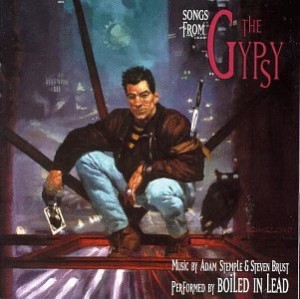 Boiled in Lead‘s Songs from The Gypsy is a collision, of sorts. That’s a metaphor, of course, but then, if you can’t speak in metaphor, you can’t talk about music.
Boiled in Lead‘s Songs from The Gypsy is a collision, of sorts. That’s a metaphor, of course, but then, if you can’t speak in metaphor, you can’t talk about music.
First, the basics, for those who, like yours truly, are not familiar with the band. At the time of this recording, personnel were Josef Kessler (fiddle), Adam Stemple (guitar, vocals), Robin “Adnan” Anders (percussion), and Drew Miller (bass, dulcimer). The band, in the course of its history, has gone through no more personnel changes than any other group, but no fewer. Enough of that.
Steven Brust, with Stemple, wrote these songs. They grew out of characters he created in The Sun, The Moon, and The Stars, and which found new life later on in his collaboration with Megan Lindholm, The Gypsy. For those who have read anything of Brust besides Taltos (and if you haven’t, you are really shortchanging yourself), the lyrics touch on many of Brust’s archetypes, particularly the Coachman, who recurs in his works (Brokedown Palace, The Khaavren Romances), always taking people to where they need to be, whether they knew it or not.
There is a strong narrative component to the flow of this collection, not surprising perhaps, considering that the motivating force is an extraordinarily accomplished novelist. Many of these are story songs, starting with the first cut, “Raven, Owl, and I.” Anyone who has read Brust’s non-Taltos works knows that he can deal with serious as well as anyone else when he elects to drop the ironic manner of that cycle. (Agyar, Brust’s “vampire” novel, is ultimately one of the most heartwrenching versions of that genre I’ve read.)
There’s a lot of grit here. This is not, overall, a happy album. Loss is the overriding feeling, dislocation, wandering for someone who may not ever have wanted to be a wanderer but has become resigned. Then one is caught by a track like “Ugros,” a traditional Hungarian melody arrestingly performed by Kessler, a lively tune that dips into moments of pathos, and then back into the same liveliness, doubletime. (The accompaniment by the other musicians is subtle and absolutely right.)
And what about the music itself? OK — these guys are right on the mark. This is an absolute gem of an album. When I finally had a chance to sit down and really listen, it grabbed me and didn’t let go. The band’s “genre” (if they really have one) has been variously described as “celtopunk.” Not really, at least not on this cycle: there’s little irony here — at least not the kind of arch, almost self-conscious irony one often finds in “punk.” The irony here is of the cosmic, tragic sort that one might find in Euripides. “Rock ‘n’ reel” has also been suggested, but again, not here, maybe because the impetus for this album is Hungarian, which is about as far from Celtic as you can get and still be in Europe. And underneath the gypsy melancholy and its lilting rhythms, there’s a continual sense of oscillating between the heyday of the ’60s folk-protest movement and being lost in a riff by Clapton or Trower at their best, with some real hard-core R & B for good measure. The strongly folk-styled “Raven, Owl, and I” leads right into a hard rock “Leanan Sidhe” and the album moves back and forth from there. And then all the strands meet.
Wow!
The general musicianship is superb. No arguments anywhere. Stemple’s vocals sometimes out-dylan Dylan, as though he were a little beyond the limit of what’s possible, but on a song like “Blackened Page,” he can break your heart. (A mention also for Lojo Russo, whose supporting vocals on “Hide My Track” and “The Gypsy” are intense.) (Note to self: find more Boiled in Lead.)
Those who are looking for traditional Celtic tunes are not going to find them here. Don’t let that stop you, because what you will find is some damned fine music.
(Omnium, 1995)
